非谓语动词
非谓语动词讲解(超全)
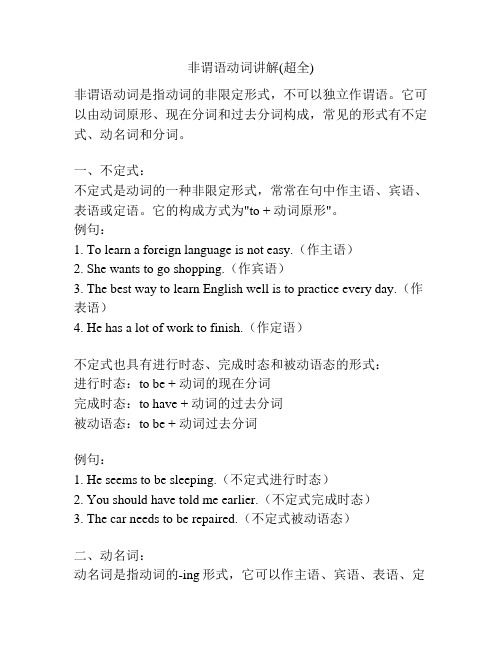
非谓语动词讲解(超全)非谓语动词是指动词的非限定形式,不可以独立作谓语。
它可以由动词原形、现在分词和过去分词构成,常见的形式有不定式、动名词和分词。
一、不定式:不定式是动词的一种非限定形式,常常在句中作主语、宾语、表语或定语。
它的构成方式为"to + 动词原形"。
例句:1. To learn a foreign language is not easy.(作主语)2. She wants to go shopping.(作宾语)3. The best way to learn English well is to practice every day.(作表语)4. He has a lot of work to finish.(作定语)不定式也具有进行时态、完成时态和被动语态的形式:进行时态:to be + 动词的现在分词完成时态:to have + 动词的过去分词被动语态:to be + 动词过去分词例句:1. He seems to be sleeping.(不定式进行时态)2. You should have told me earlier.(不定式完成时态)3. The car needs to be repaired.(不定式被动语态)二、动名词:动名词是指动词的-ing形式,它可以作主语、宾语、表语、定语或状语。
在句中的位置和用法与名词相似。
例句:1. Reading is my favorite hobby.(作主语)2. I enjoy swimming in the summer.(作宾语)3. Her dream is becoming a famous singer.(作表语)4. The girl standing over there is my sister.(作定语)5. He went to the party without saying goodbye.(作状语)动名词与不定式的区别在于动名词具有进行时态和被动语态,而不定式没有。
非谓语动词非谓语形式(详细)

动词非谓语形式一.基本概念:顾名思义,不担任谓语成分而担任其他语法功能的动词称为非谓语动词,有to do (动词不定式) / -ing (现在分词 / 动名词) / -ed (过去分词)三个形式。
由于他们不受主语人称和数的限制,故也称为"非限定动词"。
(学习中不要刻意去区分现在分词和动名词)二.非谓语动词的时态和语态意义:英语中动词有两大基本特征:时态和语态的变化。
非谓语动词也是动词,当然也具备动词的这两大特征。
1. 时态概念:非谓语动词只有"过去、现在和将来"三个时间概念,他与谓语动词时态的区别是:谓语动词表示的是实际时间概念,如I am learning English.是指讲话的时候或那段时间里"我正在学英语"。
而非谓语动词的"过去、现在和将来"是指相对于谓语动词而言的"过去、现在和将来",即先于谓语动词的行为或状态称为"过去时",与谓语动词的行为或状态发生在同一时间(段)的称为"现在时",而发生在谓语动词的行为或状态之后的称为"将来时"。
这个时间概念对于后面要讲的非谓语动词的句法功能是非常重要的。
2. 语态概念:与谓语动词一样,非谓语动词也有主动语态和被动语态之分。
也就是要记住四句话:(1) 表示将来时;(2) 表示现在时;(3) 表示过去时(一定是被动的)(4) 动词不定式的完成时表示过去时非谓语动词的上述时态和语态概念是理解非谓语动词句法功能、应试判题和翻译的基础。
请你判断一下,下面句子中的非谓语动词是什么时态和语态:Your duty is to look after the sick child. (你的责任是照料这个病孩。
将来/ 主动)The sick child needs to be looked after by a special person. (这个病孩需要专人照顾。
非谓语动词(Non-finiteverbs)
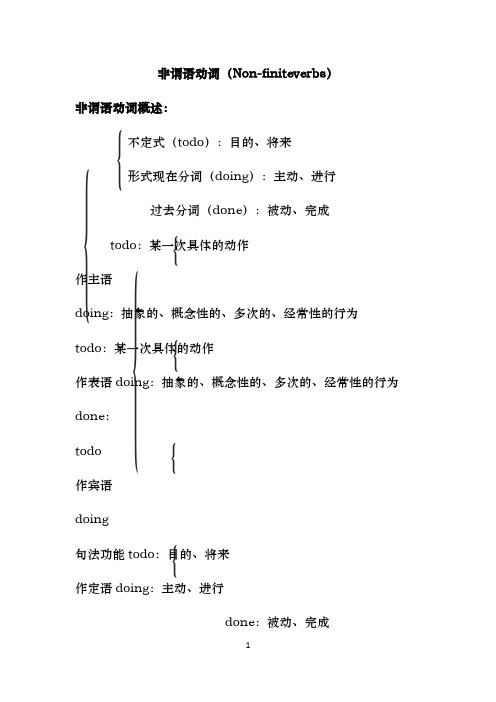
非谓语动词(Non-finiteverbs)非谓语动词概述:不定式(todo):目的、将来形式现在分词(doing):主动、进行过去分词(done):被动、完成todo:某一次具体的动作作主语doing:抽象的、概念性的、多次的、经常性的行为todo:某一次具体的动作作表语doing:抽象的、概念性的、多次的、经常性的行为done:todo作宾语doing句法功能todo:目的、将来作定语doing:主动、进行done:被动、完成todo:目的、将来作宾补doing:主动、进行done:被动、完成todo:目的、将来作状语doing:主动、进行done:被动、完成独立成分作状语n./pron.+todo/doing/done独立主格结构with的复合结构GrammarI:非谓语动词的形式(一)过去分词:过去分词只有一种形式,就是一般式done。
①单独表示一个被动的动作;②也可以单独表示动作已经完成;③还可以同时表示被动和完成。
(二)现在分词的各种形式:(三)主动被动用法一般doing beingdone doing的动作与谓语动作几e.g.1._______________(hear)thenews,theycouldn’thelpla ughing.e.g.2.Not________________(finish)thetask,theyhavetostayt hereforanothertwoweeks.e.g.3.________________(turn)offtheTVset,hebegantogoover (复习)hislessons.e.g.4.______________(heat加热),thewatergetshot.e.g.5._______________(build)forhalfayear,thebuildingbeca meourlibrary.e.g.6._______________(tell)manytimes,hestillrepeated(重复)thesamemistake.e.g.7.Isawtherewasaboy________________(blame)byhisfat her.(四)不定式的各种形式(五)e.g.1.Therearemanydishes_________________(wash)inthek itchen.SoIdon’thavetimetoseeafilmwithyoutonight.注意:非谓语动词的否定形式是在其前加notGrammarII:todo、doing作主语或表语一、todo、doing作主语的一般用法:e.g.1.Toswimtodayisagoodideae.g.2.Eatingtoomuchisbad foryourhealth.思考:todo作主语,表__________________________________________________的动作;doing作主语,表_________________________________________________的动作。
什么叫非谓语动词
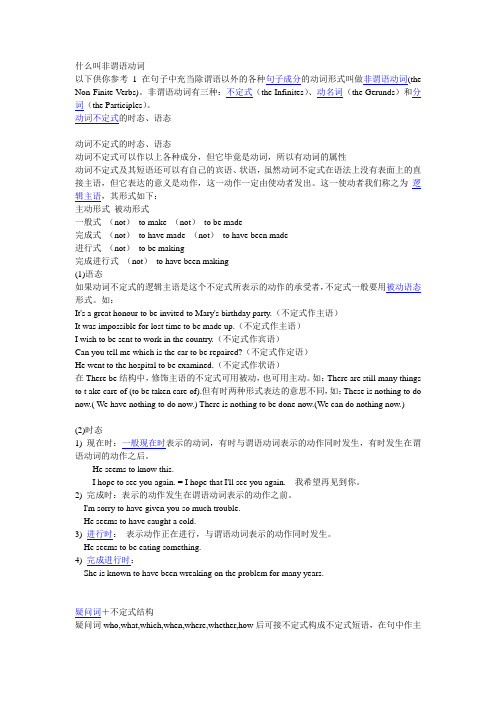
什么叫非谓语动词以下供你参考 1 在句子中充当除谓语以外的各种句子成分的动词形式叫做非谓语动词(the Non-Finite Verbs)。
非谓语动词有三种:不定式(the Infinites)、动名词(the Gerunds)和分词(the Participles)。
动词不定式的时态、语态动词不定式的时态、语态动词不定式可以作以上各种成分,但它毕竟是动词,所以有动词的属性动词不定式及其短语还可以有自己的宾语、状语,虽然动词不定式在语法上没有表面上的直接主语,但它表达的意义是动作,这一动作一定由使动者发出。
这一使动者我们称之为逻辑主语,其形式如下:主动形式被动形式一般式(not)to make (not)to be made完成式(not)to have made (not)to have been made进行式(not)to be making完成进行式(not)to have been making(1)语态如果动词不定式的逻辑主语是这个不定式所表示的动作的承受者,不定式一般要用被动语态形式。
如:It's a great honour to be invited to Mary's birthday party.(不定式作主语)It was impossible for lost time to be made up.(不定式作主语)I wish to be sent to work in the country.(不定式作宾语)Can you tell me which is the car to be repaired?(不定式作定语)He went to the hospital to be examined.(不定式作状语)在There be结构中,修饰主语的不定式可用被动,也可用主动。
如:There are still many things to t ake care of (to be taken care of).但有时两种形式表达的意思不同,如:These is nothing to do now.( We have nothing to do now.) There is nothing to be done now.(We can do nothing now.)(2)时态1) 现在时:一般现在时表示的动词,有时与谓语动词表示的动作同时发生,有时发生在谓语动词的动作之后。
非谓语动词9种形式

非谓语动词9种形式
1.不定式:to+动词原形,表示目的、原因、结果等。
2. 现在分词:动词+ing,表示主动、进行或描述。
3. 过去分词:动词+ed,表示被动、完成或描述。
4. 动名词:动词+ing,作主语、宾语或介词后的宾语。
5. 分词短语:现在分词或过去分词+其他成分,作状语或定语。
6. 带to的分词短语:to+过去分词,表示被动或完成,作状语或定语。
7. 带having的分词短语:having+过去分词,表示完成,作状语或定语。
8. 带不定式的分词短语:动词+不定式,表示目的、结果、方式,作状语或定语。
9. 带介词的分词短语:动词+介词+现在分词或过去分词,作状语或定语。
- 1 -。
非谓语动词最完整版

非谓语动词一、非谓语动词的概念动词的基本用法是作谓语。
当句中已经有了谓语动词了,要选或要填的动词就只能用非谓语形式了。
二、非谓语形式的三种形式及基本用法:1、动词不定式:to do 表示目的和将来2、动词的ing : doing 表示主动和进行3、动词的过去分词:done 表示被动和完成非谓语动词(一)——动词不定式一、不定式(to do)不定式由“to+动词原形”构成,其否定形式是“not to+动词原形”。
不定式可以带宾语或状语构成不定式短语,没有人称和数的变化,但有时态和语态的变化。
不定式可作主语、宾语、状语、表语和定语,但不能单独作谓语。
不定式运用口诀:本领最多不定式,主,表,宾,补,定和状,样样成分都能干,只有谓语它不敢,大家千万要当心,有时它把句型改,做主宾时用“it”,自己在后把身藏,七个感官三使役,宾补要把to甩开,疑问词后接上它,宾语从句可充当,逻辑主语不定式,不定式前for sb,to前not 是否定,各种用法区别开。
1. I am sorry to ________ you so much trouble. (2008 江苏)A. have givenB. have been givenC. giveD. giving答案:A简析:be sorry to have done sth 意为“已经干了某事而遗憾”,to have done是不定式的完成形式,表示先于谓语动词的动作。
B,被动形式,不合题意。
变式训练:2.The promising young man is said to ______ two novels.A. have writtenB. have been writtenC. writeD. writing (A)2.不定式的句法功能1)作主语:(谓语动词一般用单数)To finish the work in ten minutes is very hard.在十分钟内完成这项工作很难。
什么是非谓语动词
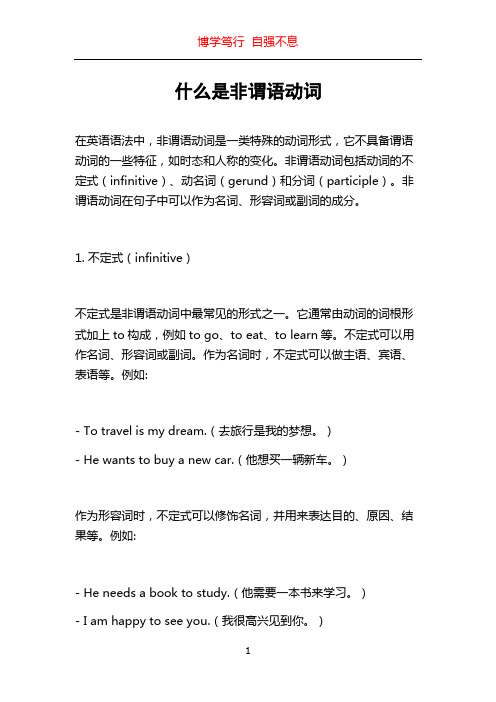
什么是非谓语动词在英语语法中,非谓语动词是一类特殊的动词形式,它不具备谓语动词的一些特征,如时态和人称的变化。
非谓语动词包括动词的不定式(infinitive)、动名词(gerund)和分词(participle)。
非谓语动词在句子中可以作为名词、形容词或副词的成分。
1. 不定式(infinitive)不定式是非谓语动词中最常见的形式之一。
它通常由动词的词根形式加上to构成,例如to go、to eat、to learn等。
不定式可以用作名词、形容词或副词。
作为名词时,不定式可以做主语、宾语、表语等。
例如:- To travel is my dream.(去旅行是我的梦想。
)- He wants to buy a new car.(他想买一辆新车。
)作为形容词时,不定式可以修饰名词,并用来表达目的、原因、结果等。
例如:- He needs a book to study.(他需要一本书来学习。
)- I am happy to see you.(我很高兴见到你。
)作为副词时,不定式用来修饰动词、形容词或副词,表示目的、结果、方式等。
例如:- She works hard to succeed.(她努力工作以获得成功。
)- He walked slowly to avoid falling.(他慢慢地走以避免摔倒。
)2. 动名词(gerund)动名词是动词的-ing形式,它可以作为一个名词在句子中使用。
与不定式不同,动名词可以作为主语、宾语、表语、介词宾语等。
例如:- Swimming is good exercise.(游泳是一项好的锻炼。
)- I enjoy singing.(我喜欢唱歌。
)动名词也可以与一些特定的动词或动词短语搭配使用,这些短语通常以动名词作为宾语。
例如:- He admitted stealing the money.(他承认偷了钱。
)- She can't help laughing.(她禁不住笑。
(完整版)非谓语动词语法讲解
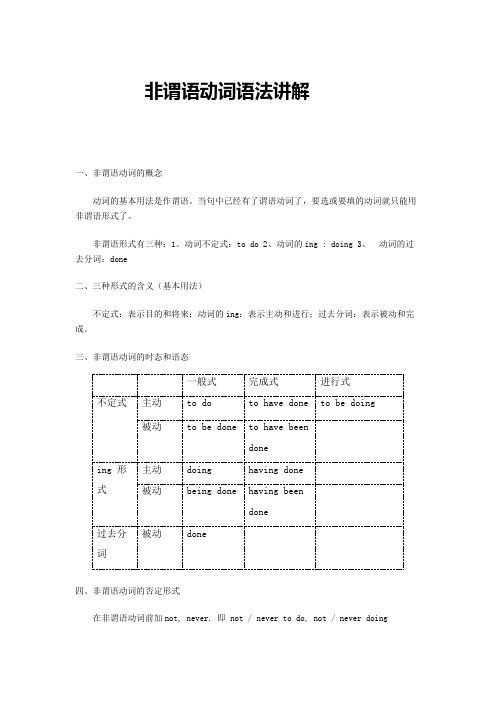
非谓语动词语法讲解一、非谓语动词的概念动词的基本用法是作谓语。
当句中已经有了谓语动词了,要选或要填的动词就只能用非谓语形式了。
非谓语形式有三种:1、动词不定式:to do 2、动词的ing : doing 3、动词的过去分词:done二、三种形式的含义(基本用法)不定式:表示目的和将来;动词的ing:表示主动和进行;过去分词:表示被动和完成。
三、非谓语动词的时态和语态一般式完成式进行式不定式主动to do to have done to be doing被动to be done to have beendoneing 形式主动doing having done 被动being done having beendone过去分词被动done四、非谓语动词的否定形式在非谓语动词前加not, never. 即 not / never to do, not / never doing五、非谓语动词的复合结构不定式的复合结构:for / of sb. to do sth.动词 ing 形式的复合结构:宾格或所有格+doing (-ing 形式作主语时,用的所有格+doing)六、非谓语动词的做题步骤1、判定是否用非谓语形式。
方法:看看句子中是否已有了谓语动词了2、找非谓语动词的逻辑主语。
方法:非谓语动词的逻辑主语一般是句子的主语。
3、判断主被动关系。
方法:非谓语动词与其逻辑主语的主动还是被动关系。
4、判断时间关系。
方法:分析句子,看看非谓语动词所表示的动作发生在谓语动作之前、之后还是同时。
之前常用 done; 之后常用to do; 同时常用doing.学习非谓语形式时,建议把三种形式一起来比较学习,会更加有效一些。
七、非谓语动词作主语和表语的比较1、不定式和动名词作主语和表语a. 不定式表示一次性的、具体的动词。
动词ing 常表示一般的、泛指的或习惯性的动作。
如:________ is a good form of exercise for both young and old.A. The walkB. WalkingC. To walkD. Walk(分析) a good form 暗示泛指一般的行为,用动名词作主语,选 Bb. 不定式作主语时,常用it 作形式主语,即用句型:It is + adj. / n. + (for / of sb. ) to do sth.It’s important for us to learn English well.It’s kind of you to help us.注意:下面几个句型是用动名词:It’s no good / use doing sth.It’s usel ess doing sth.There is no need to do sth.2、不定式、动名词、分词作表语的比较1、不定式、动名词作表语,.表示主语的内容。
- 1、下载文档前请自行甄别文档内容的完整性,平台不提供额外的编辑、内容补充、找答案等附加服务。
- 2、"仅部分预览"的文档,不可在线预览部分如存在完整性等问题,可反馈申请退款(可完整预览的文档不适用该条件!)。
- 3、如文档侵犯您的权益,请联系客服反馈,我们会尽快为您处理(人工客服工作时间:9:00-18:30)。
非谓语动词专项练习题一、用所给动词适当形式填空:A . ① I want one magazine ______ . ( read )②My teacher wanted me ______ this question . ( answer )③The woman wanted her husband ______ at once . ( examine )④My bicycle wants _______ . ( repair )B . ①What made you ______ so ? ( think )②The girl was made _____ a man she didn't love at all . ( marry )③The show made me _______ in the study of science . ( interest )④He raised the picture to make everyone _______ clearly . ( see )⑤He raised his voice to make himself _______ . ( hear )⑥My father himself made some candles _______ light . ( give )⑦The boss made the workers _______ day and night . ( work )C . ①Y ou'd better get your own room _______ . ( clean )②Yesterday he got his wallet _______ . ( steal )③Y ou should get your friends _______ you . ( help )④The lecture got us _______ . ( think )⑤Don't get ________ in the rain . ( catch )D . ①Did you see somebody _______ into the room ? ( steal )②I saw him _______ in the room at that time . ( read )③She was glad to see her child ________ good care of . ( take )④I saw her _______ at the windows , thinking . ( seat )⑤She was seen ________ here . ( come )E . ①I like _______ very much . ( swim )②I don't like _______ TV at this time . ( watch )③He never likes _______ at the meeting . ( praise )④I feel like _______ to the cinema . ( go )⑤Would you like ______ with me ? ( go )F . ①The man ______ at the meeting now is from the south . ( speak )②I don't know the professor ______ at the meeting tomorrow . ( speak )③He is the professor _______ to dinner . ( invite )G . ①It was so cold and he had the fire _______ all night long . ( burn )②I have a lot of exercises ________ today . ( do )③"Do you have nay clothes _______ today ? "asked Mother . ( wash )④Y ou'd better have that bad tooth _______ out . ( pull )⑤I want to have him _______ a car for me . ( find )H . ①He doesn't do anything but _______ all day . ( play )②We have no choice but _______ . ( obey )③I'm thinking of how _______ my English . ( improve )④He made an apology for _____ late . ( be )I . ①He told us about his trip in an _______ voice . ( excite )②He told us his story in a _______ voice . ( tremble )③At the sight of a snake , the little girl was very _______ . ( frighten )④The boy was _______ , so I didn't believe him again . ( disappoint )J . ①He is looking forward to ______ college . ( enter )②He is looking forward to _____ nothing . ( see )K . ①When he heard the news , he couldn't help ________ with joy . (jump)②I couldn't help ______ by the beauty of nature . ( strike )③Sorry , I can't help ______ the housework today . ( do )L . ①______ enough time , we'll do it better . ( give )②______ a candle , he went on reading . ( light )③______ from the hill , the park looks more beautiful . ( see )④______ the people well , we must work hard at our lessons . ( serve )二、单项选择:(1)1. Saying always has less difficulty than _____.A. doneB. doingC. to doD. having done2. The girl is seriously ill. There is _____.A.nothing to do but send for a doctorB.something to do but to send for a doctorC.nothing to do but to send for a doctorD.anything to do but sending for a doctor3. The rest of the money _____ to Alice.A. is to sendB. are to sendC. is to be sentD. are to be sent4. Although swimming is his favorite sport, yet he doesn’t like _____ today.A. to swimB. swimmingC. swimD. to have swim5. She said she was sorry _____ the train, so she had to stay here for another day.A. missingB. having missedC. to missD. to have missed6. _____ the same mistake again made his parents very angry.A. His being madeB. He has madeC. He had makingD. His making7. I find the man hard _____.A. to be pleasedB. pleasingC. pleasedD. to please8. Y ou’d better not have the lights _____ all day long.A. burningB. burnedC. to burnD. being burnt9. It is _____ thinking about it now.A. of no useB. not useC. no useD. not of any uses10. —Would you like to sing a song for us?—_____.A. I prefer notB. I prefer not toC. I prefer to notD. I wouldn’t prefer11. He insisted _____ the working site.A. to be sent toB. being sent toC. on being sent toD. that to be sent to12. During the next ten years, she had to work hard _____ for the necklace.A. payingB. to payC. for payingD. in order to paying13. Janet was angry at _____.A. my not waiting for herB. I didn’t wait for herC. me not wait for herD. me to not wait for her14. I prefer staying at home _____ the theater.A. to go toB. for going toC. to going toD. rather than go15. Please get someone _____ the washing machine. I want to get it _____ as soon as possible.A. to repair/to be repairedB. repair/repairedC. to repair/repairingD. to repair/repaired16. _____ more time, he could have done the work much better.A. To be givenB. To giveC. GivenD. Giving17. The information _____ to us is of great value.A. broughtB. takenC. being takenD. being carried18. The building _____ next month will be a modern hospital.A. builtB. being builtC. to be builtD. be built19. Jessie was sick _____ such noise.A. of hearingB. to hearC. of being heardD. heard20. _____, he left the room.A. Finishing the workB. Had finished the workC. After finished the workD. Having finished the work21. _____ afraid _____ behind, Bill studied even harder than ever before.A. To be/of fallingB. Being/fallC. Being/of fallingD. To be/to fall22. The machine requires _____, so the workers are required _____ ready.A. repair/to getB. repairing/to getC. repairing/gettingD. to be repaired/getting23. Everyone dislikes _____.A. being laughedB. to be laughedC. being laughed atD. to be laughed at24. Would you like Helen _____ you since you have some difficulty?A. helpingB. to helpC. has helpedD. help25. He is beginning _____ his mistakes.A. correctB. to correctC. correctingD. corrected26. The Americans can’t use chopsticks _____.A. to eatB. to eatingC. eatingD. to eat with27. My wish is _____ the people well in the future.A. to serve forB. to serveC. servingD. serving for28. The poor boy, _____ with extraordinary strength, _____ from the ground.A. filled/roseB. filling/roseC. full/raisedD. filled/risen29. Most shops are open every day, Sunday _____.A. includingB. includedC. being includedD. to include30. _____ hot, he left only his stomach _____ with a piece of cloth.A. Feeling/coveringB. Feeling/coveredC. Felt/coveredD. Felt/covering31. He advised _____ a meeting _____ the problem.A. holding/to discussB. holding/for discussingC. to hold/to discussD. hold/discussing32. _____ the teacher, and he will tell you the answer.A. AskingB. AskC. If askD. If you ask33. The thief entered the room without _____.A. noticingB. being noticedC. having noticedD. having been noticed34. I happened _____ the story when she told me about it.A. having heard ofB. to have heard ofC. to be heard ofD. to hear of35. He is said _____ abroad already.A. having sentB. to be sendingC. to have been sentD. being sent36. He was made _____ working because of his poor health.A. stoppingB. to stopC. stoppedD. stop37. Do you consider it any good _____ again?A. to tryB. tryC. tryingD. for you to try38. I regret _____ you that we are unable to offer you a job.A. informingB. having informedC. to informD. to informing39. I would appreciate _____ back this afternoon.A. you to callB. you callC. your callingD. you’re calling40. She admitted _____ the key.A. being takingB. to takeC. having takenD. to have taken41. Besides _____, she is kind and tender.A. beautifulB. being beautifulC. she beautifulD. is beautiful42. I don’t want to speak to you, but I _____.A. have to speakB. have toC. must speakD. must43. I wondered whether the movie was _____ worth _____.A. very/seeingB. well/being seenC. very/being seenD. well/seeing44. The lecturer began by _____ us where the island was, and went on _____ about its history.A. telling/talkingB. to tell/to talkC. telling/to talkD. he told/talking45. After seeing the movie, _____.A. the book was read by himB. the book made him want to read itC. he wanted to read the bookD. the reading of the book interested him46. —Why doesn’t he take notes?—He has no pen _____. He seems _____ it.A.to write/to forget bringingB.to write with/to forget to bringC.to use with/to have forgotten to bringD.to write with/to have forgotten to bring47. When _____, water can be changed into vapor.A. heatedB. being heatedC. having been heatedD. to heat48. Having finished the work, _____.A.it was almost six o’clockB.a postman came and delivered the evening paper and some lettersC.supper had already been preparedD.we had a rest and then had supper49. _____, she felt quite shy at the party.A. As she a strangerB. Being a strangerC. According to a strangerD. She was a stranger50. Flank went to the swimming pool _____ swimming.A. to goB. goneC. goingD. go51. The _____ girl sat in the corner, crying.A. frightenB. frightenedC. frighteningD. fright52. On a _____ morning the little match girl was found _____ at the corner of the street.A. freezing/freezingB. freezing/frozenC. frozen/frozenD. frozen/freezing53. They found a _____ old man _____ on the ground when the door was broken open.A. dying/lyingB. dying/liedC. dead/liedD. dead/lain54. Be quick, or you’ll get _____ in the rain.A. to be caughtB. catchingC. to catchD. caught55. Who could have imagined such a sweet-tempered girl as Jane _____ such a thing!A. doingB. to doC. will doD. does56. He told me not to leave the pot _____.A. uncoveredB. to uncoverC. to be uncoveredD. uncovering57. The experience made him _____ the study of science.A. interest inB. to interest inC. interesting inD. interested in58. He managed to make himself _____ with his _____ English.A. understood/breakingB. understood/brokenC. understand/breakingD. understand/broken59. Did you hear the sound like that of a door _____?A. burstB. to burst inC. burst inD. to be burst in60. I was deep in thought, so I didn’t notice _____.A. him to come inB. him come inC. he come inD. him coming in61. Have you any objection to _____ there on foot?A. be goingB. goingC. goD. went62. The wallet was returned to him without anything _____.A. missedB. to be missedC. missingD. to miss63. The teacher was far from _____ with the result of the exam.A. satisfyB. satisfiedC. being satisfiedD. satisfying64. Hurry up! Mother is sure _____ us at home.A. waitingB. to wait forC. to be waitingD. to be waiting for65. Mr Brown is said _____ a new novel.A. to writingB. to have been writtenC. to be writtenD. to have written66. When _____ into a warm room, the ice soon changed to water.A. to takeB. to be takenC. takingD. taken67. The old man walked in the street _____.A. followed his sonB. and following his sonC. and followed by his sonD. followed by his son68. _____ with fear, a hungry fox hid himself in a small cave, _____ his tail to the rain.A. Trembling/exposingB. Trembled/exposedC. Trembled/exposingD. Trembling/exposed69. The two farmers _____ what appeared to be small guns forced the enemy officer to hand in his map.A. carriedB. were carryingC. carryingD. had carried70. Six _____ nine makes fifteen.A. added toB. adds toC. added up toD. added by71. The lecturer _____ will be here tomorrow.A. to talk about so muchB. to be talking about so muchC. so much talking aboutD. so much talked about72. _____ some of the questions _____, the Premier said goodbye to us.A. Left/unansweredB. Leaving/unansweredC. Leaving/unanswerD. Left/unanswer73. _____ her mother had come, her face lit up.A. HearingB. Having heardC. When heardD. When she heard74. _____ in white, she looks much more beautiful.A. WearingB. DressingC. DressedD. Having dressed75. _____, the boy couldn’t enter his house.A. Since the key had lostB. The key being lostC. Lost the keyD. Having lost the key76. The Arctic is considered _____ the northern part of the Atlantic.A. having beenB. to have beenC. to beD. being77. It is impossible for the work _____ within a month.A. finishingB. being finishingC. to finishD. to be finished78. I am too glad _____ you.A. to seeB. seeingC. sawD. at seeing79. There is _____ what the weather will be like.A. not knowingB. no knowingC. not knowD. no known80. The bottle _____ the poison was sent to the laboratory for a test.A. containingB. containedC. which containingD. which is contained81. _____ the children, we are all sure everything will be all right.A. With him taken care ofB. With he taken care ofC. With him taking care ofD. With he taking care of82. At first she wanted to go to the cinema, but on second thoughts she decided it would be better _____ at home and _____.A. stay/workB. to stay/to workC. stay/to workD. to stay/work83. He didn’t speak to me, let alone _____ me.A. helpB. to helpC. helpingD. helped84. The people’s government does its best to have the living standard of the people _____.A. risenB. raisedC. riseD. raise85. The little girl found her teddy bear _____ under the bed.A. hidingB. to hideC. hideD. hidden86. Mr Smith is _____ to our English evening.A. more pleased than to comeB. more pleased to come thanC. more than pleased to comeD. more pleasing than to come 87. Once _____, a bad habit is rather difficult to get rid of.A. formedB. to be formedC. formingD. having formed88. Y ou can have no idea what is _____ to do when you come to see the strange boss.A. orderingB. being orderedC. to orderD. to be ordered89. The noise of the door _____ the baby.A. closing wakenB. to close wokeC. closed wakeD. being closed woke90. Please leave a window _____, for it’s too hot.A. openB. openingC. to openD. opened91. _____ not knowing the answer to such an easy question!A. HopeB. DecideC. ImagineD. Think92. He asked to be kept _____ about developments.A. informingB. informedC. to informD. inform93. _____ everywhere, the wolves had nowhere _____ themselves.A. Hunting/to hideB. To hunt/to hideC. Hunted/hidingD. Hunted/to hide94. It _____ this way.A. used to doB. used to be doneC. is used to doingD. is using to do95. They have a lot of difficulty _____.A. in overcomingB. to overcome itC. to overcomeD. to be overcome96. Didn’t you forget us _____ together in the countryside?A. to workB. to workingC. workingD. worked97. Y ou always hear about planes _____ because of technical faults.A. having been delayedB. being delayedC. having delayedD. delaying98. These are needed for _____ clothes, paper and other necessaries.A. the making ofB. making ofC. to makeD. makings99. Have the police caught _____ yet?A. the prisoner who escapesB. the escaping prisonerC. the escaped prisonerD. the prisoner have escaped100. Do you still remember _____ you when you stayed in hospital?A. my mother and me visitingB. my mother’s an d my visitingC. my mother and me to visitD. my mother and me to have visited三、单项选择(2)1. There ______ no classes yesterday, we paid a visit to the Great Wall.A. wasB. beingC. wereD. had been2. The policeman rushed into the room only ______ an old lady lying on the ground.A. foundB. findC. findingD. to find3. The boy lay on the ground, his eyes ______ and his hands ______.A. closing; tremblingB. closed; tremblingC. closed; trembledD. closing; trembled4.______, the girls raced on to the second runners.A. Stick in handB. With a stick in her handC. Sticks in handD. Sticks in hands5. Each of them got up early ______ to catch the early bus.A. to hopeB. hopingC. so thatD. and6. How pleased the Emperor was ______ what the cheats said!A. hearingB. heardC. hearD. to hear7. We should prevent pollution ______ happily.A. from livingB. livingC. to livingD. to live8.I am busy now, so I can’t help ______ the machine.A. repairB. to have repairedC. repairingD. fixing9. Jane came very close ______ a gold medal for Britain in the Olympics.A. to winB. winningC. to winningD. to be won10. The boy seated himself in the corner with his back ______ to his father.A. turningB. to turnC. to be turnedD. turned11. ----By the way, when did you get your bedroom ______?----Last week.A. to paintB. paintedC. paintingD. to be painted12. He likes ______, but he doesn’t like ______ today because it is too cold.A. to swim; to swimB. swimming; swimmingC. to swim; swimmingD. swimming; to swim13. There is ______ what the weather will be like.A. not knowingB. no knowingC. not knowD. no known14. The novel is said ______ into many languages.A. to translateB. being translatedC. to have been translatedD. having been translated15. I’m examining the composition he has just finished ______ the possible mistakes in it.A. correctingB. to correctC. correctedD. correct16. They would not allow him ______ across the enemy line.A. to risk goingB. risking to goC. for risk to goD. risk going17. He spent as much time as he could _____ the child.A. teachingB. to teachC. teachD. for teaching18. ----Alice, why didn’t you come yesterday?----I ______, but I had an unexpected visitor.A. hadB. wouldC. was going toD. did19. How pleased the Emperor was ______ what the cheats said!A. hearingB. to hearC. heardD. hear20. ______ the room, a letter was laid on the ground.A. EnteringB. Having enteredC. He enteredD. Mrs Green entering21. They set out ______ for the ______ boy.A. searching; losingB. searching; lostC. to search; lostD. to search; missed22. ______ her mother had come, her face lit up.A. HearingB. Having heardC. When hearingD. When she heard23. They arrived at their university very late, ______ the gate closely shut.A. foundB. to findC. findD. finding24. ----Do you have anything more ______, sir?----No. Y ou can have a rest or do something else.A. typingB. to be typedC. typedD. to type25. The manager promised to keep me ______ of how our business was going on.A. to be informedB. on informingC. informedD. informing26. With a lot of difficult problems ______, the manager felt worried all the time.A. to settleB. settlingC. settledD. being settled27. Will those ______ the children from abroad come to the headmaster’s office?A. teachingB. teachC. who teachesD. who teaching28. After ______ for the job, you will be required to take a language test.A. being interviewedB. interviewedC. interviewingD. having interviewed29. They apologized for ______ to attend the meeting.A. their not being ableB. their being not ableC. them not ableD. them being able not30. They would not allow him ______ across the enemy line. A. to risk going B. risking to goC. for risk to goD. risk going31. ______ to nuclear radiation, even for a short time, may produce variants(变异体) of genes in human bodies.A. Being exposedB. Having exposedC. ExposedD. After being exposed32. China became the 143rd member of the World Trade Organization on December 11, 2001, thus ______ its 15-year wish to join the global trade body.A. having realizedB. realizedC. realizingD. to realize33. Tom looked at Jenny, tears ______ his eyes, and shouted out the words ______ in his heart for years.A. filling; having hiddenB. filled; hiddenC. filling; hiddenD. filled; hiding34. They apologized for ______ to attend the meeting.A. their not being ableB. their being not ableC. them not ableD. them being able not35. Which will you enjoy ______ your vacation, traveling abroad or working in the countryside?A. to spendB. spendC. spendingD. spent36. ----Will you please tell us how you can seize the robbers?----I will spend a whole week ______ in your room to wait for their coming.A. lockingB. to lockC. lockedD. being locked37. I regret ______ you that they are unable to come to your wedding tomorrow.A. informingB. having informedC. to have been informedD. to inform38. He wondered if he could slip out of the lecture hall without anyone ______.A. noticingB. noticedC. to noticeD. being noticed39. After ______ for the job, you will be required to take a language test.A. being interviewedB. interviewedC. interviewingD. having interviewed40. He spoke in such a high voice ______ out in the street.A. as to be heardB. to be heardC. as to hearD. to hear41. As early as 1647 Ohio made a decision that free, tax-supported schools must be set up in every town ______ 50 households or more.A. havingB. to haveC. to have hadD. having had42. The building project ______ next year is, I think, not easy ______ in time.A. being carried out; to completeB. carried out; to be completedC. to be carried out; to completeD. to be carried out; to be completed43. The reason ______ she gave for not coming to the party is that her mother wouldn’t allow her to.A. thatB. whatC. whyD. because44. Excuse me, could you tell me how to get to the Grand Hotel? I thought it was on this corner, but I seem to ______ a mistake.A. makeB. be makingC. having madeD. have made45. ----Here’s a new pai r of shoes for you.----Thank you, but there’s no need ______ a new pair for me.A. to have boughtB. to buyC. buyingD. to be buying46. What worried the boy most was ______ to visit his father in the hospital.A. his not allowingB. his not being allowedC. having not been allowedD. his being not allowed47. To do a bit for the motherland, ______.A. working hard is necessaryB. to learn a foreign language is neededC. it is important to master scienceD. one should serve the people whole-heartedly48. Everything ______ into consideration, they ought to have another chance.A. to takeB. takenC. to be takenD. taking49. The officials discussed the plan that they would like to see ______ the next month.A. carry outB. carrying outC. to carry outD. carried out50. With a lot of difficult problems ______, the manager felt worried all the time.A. to settleB. settlingC. settledD. being settled51. ----Do you have anything more ______, sir?----No, you can have a rest or do something else.A. typingB. to be typedC. typedD. to type52. The manager promised to keep me ______ of how our business was going on.A. to be informedB. on informingC. informedD. informing。
